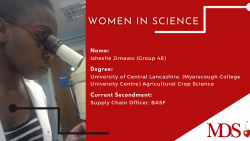Science: MDS Pathways
- Trainee Futures
“Science reflects the people who make it.”
February 11th marks the sixth year of International Day of Women and Girls in Science.
Science and technology are crucial in getting produce from field to fork and makes vital contributions to the sector. Despite STEM-related areas being so important, data published by UNESCO (United Nations Educational, Scientific and Cultural Organisation) highlights that only around 30% of all female students select STEM-related fields in higher education. Trainees on the MDS scheme can work in a range of STEM roles, and we are proud to say that gender representation is equal (Trainees who identify as Female represent 47% of the total current cohort).
To celebrate International Day of Women and Girls in Science, we interviewed MDS Trainees from the next-generation of #FemaleFoodHeroes on what they feel are some of the most significant STEM advancements coming out of the industry. Our second interview was with group 48 Trainee Isheshe Jimawo.

Why did you choose a science degree?
I wanted to make a difference.
I have always wanted to be part of the change I wanted to see. I would often hear about physical environmental crisis such as the Amazon being cut down, but I would rarely hear what is being done to address the ‘human’ element of environment and sustainability issues.
We are failing as a society to provide food for everyone on the planet, which will only get more challenging with climate change. With experience from my degree, my activities as co-founder of Food Security Nigeria, and now being part of the MDS programme, I will continue to make a difference in the local and global community.
How has your science background helped you on MDS?
I am in my first secondment in a supply chain role for agricultural products such as pesticides, herbicides and biologicals. My knowledge and interest in the science behind such products have allowed me to understand what the products do and empathise with the growers and farmers we supply. If they don’t get the products on time, it could be too late to spray due to external factor such as weather.
I also understand the challenges the business faces regarding climate change, for example, the wet spring last year has led to reduced sales of one product but higher demand for another which has a knock-on effect on fulfilling demand predictions. Seeing it from this perspective has given me a further appreciation of what goes into food production.
What do you think are the industry’s most significant issues, and how can science and technology help this?
I think climate change and how this relates to local national and global food insecurity. I believe seed varieties have a lot of interesting research. Whether it is hybrid seeds, double haploid wheat varieties or GM crops, I think these can play critical roles as it will be relatively easy for farmers and growers to adopt. The use of apps, computer software and drones to aid in integrated pest management (IPM) is also fascinating. The ability to use technology will allow farmers and growers to work smart, leading to very exciting efficiencies, especially as new biologicals, hardware and software are developed, allowing for a more holistic sustainable approach. However, it can be challenging to adopt new technologies.
I think more emphasis needs to be put on researching how to get farmers and growers to adopt current and new technologies especially in developing nations where there is often a gap in the food production levels of staple foods.